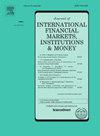情绪是如何驱动市场动态的?加密货币市场溢出效应的故事
IF 6.1
2区 经济学
Q1 BUSINESS, FINANCE
Journal of International Financial Markets Institutions & Money
Pub Date : 2025-07-28
DOI:10.1016/j.intfin.2025.102202
引用次数: 0
摘要
本文研究了加密货币市场的情绪溢出及其对市场表现的相关影响。通过构建动态连通性网络,我们捕捉了主要加密货币之间的情感溢出效应及其随时间变化的演变。然后,我们量化了加密货币的情绪溢出效应如何在一个联合分布框架内推动其市场表现,该框架衡量了在不同情绪和加密货币市场表现条件下这种联系的异质性。我们的研究结果表明,在情绪溢出中,加密货币充当净信息接收者,而碳密集型(肮脏)加密货币在推动情绪溢出方面发挥的作用大于生态友好型(清洁)加密货币。受情绪系统控制的股票市场是主要的网络提供者。从动态角度看,在新冠肺炎大流行之前,干净的加密货币比脏的加密货币具有更强的情绪溢出效应,之后两者的影响逐渐减弱。在加密货币市场的极端市场条件下,情绪溢出在推动市场表现方面的作用往往更为明显。本文章由计算机程序翻译,如有差异,请以英文原文为准。
How do emotions drive market dynamics? A tale of spillovers in cryptocurrency markets
This paper studies emotional spillovers in cryptocurrency markets and the associated impacts on market performance. By constructing a dynamic connectedness network, we capture the emotional spillover effects among the major cryptocurrencies and their time-varying evolution. We then quantify how the emotional spillovers of cryptocurrencies drive their market performance within a joint distributional framework that gauges the heterogeneity of such a linkage under different conditions of emotions and market performance of cryptocurrencies. Our results indicate that within emotional spillovers, cryptocurrencies act as the net information receiver, while carbon-intensive (dirty) cryptocurrencies play a greater role in driving emotional spillovers than eco-friendly (clean) ones. The stock market, being controlled by the emotional system, is found to be the major net provider. From a dynamic perspective, clean cryptocurrencies are shown to have stronger emotional spillover effects than dirty cryptocurrencies prior to the COVID-19 pandemic, and the effects of both gradually weaken thereafter. The role of emotional spillovers in driving market performance is often more pronounced under extreme market conditions in cryptocurrency markets.
求助全文
通过发布文献求助,成功后即可免费获取论文全文。
去求助
来源期刊
CiteScore
6.60
自引率
10.00%
发文量
142
期刊介绍:
International trade, financing and investments, and the related cash and credit transactions, have grown at an extremely rapid pace in recent years. The international monetary system has continued to evolve to accommodate the need for foreign-currency denominated transactions and in the process has provided opportunities for its ongoing observation and study. The purpose of the Journal of International Financial Markets, Institutions & Money is to publish rigorous, original articles dealing with the international aspects of financial markets, institutions and money. Theoretical/conceptual and empirical papers providing meaningful insights into the subject areas will be considered. The following topic areas, although not exhaustive, are representative of the coverage in this Journal. • International financial markets • International securities markets • Foreign exchange markets • Eurocurrency markets • International syndications • Term structures of Eurocurrency rates • Determination of exchange rates • Information, speculation and parity • Forward rates and swaps • International payment mechanisms • International commercial banking; • International investment banking • Central bank intervention • International monetary systems • Balance of payments.

 求助内容:
求助内容: 应助结果提醒方式:
应助结果提醒方式:


